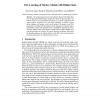Free Online Productivity Tools
i2Speak
i2Symbol
i2OCR
iTex2Img
iWeb2Print
iWeb2Shot
i2Type
iPdf2Split
iPdf2Merge
i2Bopomofo
i2Arabic
i2Style
i2Image
i2PDF
iLatex2Rtf
Sci2ools
105
click to vote
ECML
2006
Springer
2006
Springer
PAC-Learning of Markov Models with Hidden State
The standard approach for learning Markov Models with Hidden State uses the Expectation-Maximization framework. While this approach had a significant impact on several practical applications (e.g. speech recognition, biological sequence alignment) it has two major limitations: it requires a known model topology, and learning is only locally optimal. We propose a new PAC framework for learning both the topology and the parameters in partially observable Markov models. Our algorithm learns a Probabilistic Deterministic Finite Automata (PDFA) which approximates a Hidden Markov Model (HMM) up to some desired degree of accuracy. We discuss theoretical conditions under which the algorithm produces an optimal solution (in the PAC-sense) and demonstrate promising performance on simple dynamical systems.
Related Content
| Added | 22 Aug 2010 |
| Updated | 22 Aug 2010 |
| Type | Conference |
| Year | 2006 |
| Where | ECML |
| Authors | Ricard Gavaldà, Philipp W. Keller, Joelle Pineau, Doina Precup |
Comments (0)

